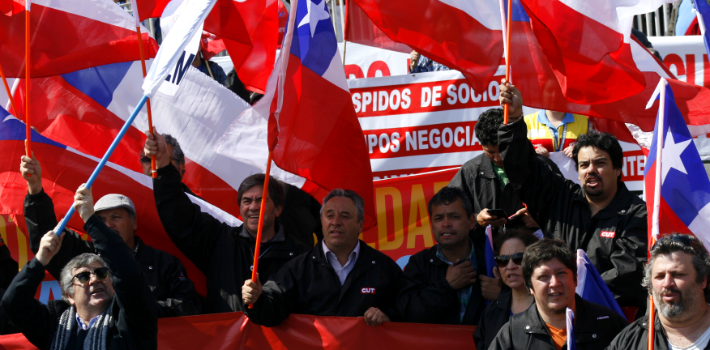
EspañolThe Chilean Senate is discussing a bill that would radically alter the labor market. While an effort to gradually improve legal frameworks is an important part of a republican system, this task demands an understanding of the lessons of history in order to be successful. This is one of the main differences between statesmen and demagogues.
Chile carries a heavy burden on her back. The statist policies implemented during most of the 20th century brought the country to the brink of the abyss. Not long ago, despair and frustration filled the nation, and the result was a bloody military dictatorship that ruled Chile between 1973 and 1990.
In this respect, Chile’s history is not much different from that of Uruguay. We had the same misguided policies during an era of prevailing populism: from the 1930s to 1950s, both countries applied foreign-exchange controls with a multiple-rate system and an import-substitution model.
But the Uruguayan government went further, enacting mandatory collective bargaining for all sectors. The move disrupted the country’s social harmony, increasing the power of unions and dooming companies to financial disaster.
The governments of Uruguay and Chile claimed to be “defending the working class” with their interventionist policies, but it was workers who paid the price for those policies with their jobs. This then led to social unrest and violent clashes in these countries. In short, they became radicalized, agitated, and traumatized societies.
Democracy returned to both countries only after significant effort, but they went separate ways. Chile developed as a thriving, dynamic society, with strong social mobility that attracted migrants from all over the world. It became a country full of opportunities that rewarded and encouraged entrepreneurship.
On the other hand, Uruguay remained a statist county, with little place for merit-based progress, pushing the most capable to find opportunities abroad. Don’t let official statistics fool you: Uruguay continues to be a country that rejects its most skilled and talented citizens.
As many progressive Chilean politicians have said, they have “learned from the errors of the past.” They have realized that it is better to keep the Communist Party away from the ruling coalition, because it will otherwise inevitably neutralize the other factions.
When Marxists take power, the unavoidable result is a society of wealthy politicians and their cronies, while the rest of the public becomes poorer and poorer, both financially and in spirit.
In Uruguay, no such lessons have been learned. Even the moderate progressive alliance Broad Front, led by President Tabaré Vázquez, has increased interventionism in the private sector.
[adrotate group=”7″]
Chilean authorities must realize that attempts to imitate Uruguay’s path will not end well, especially the efforts to reintroduce collective bargaining for wages and increasing the power of unions.
The proposed labor reform currently being debated in the Chilean Senate presents several issues that are a concern:
- Inter-company unions will be in charge of collective bargaining for all workers.
- Employers will be prohibited from granting union benefits to non-unionized workers.
- Union leaders will be allowed to disrupt a company’s activities, because employers will be banned from replacing workers on strike.
- The reform would deny an employee the option to return to work, on an individual basis, after 15 days on strike, and consequently his right to continue working.
- Employees would be prohibited from censuring union leaders during a strike.
Chilean President Michelle Bachelet, who supports the bill, said that “the experience in countries with higher levels of union membership and collective bargaining shows that it is possible to arrive at agreements for mutual benefit on a wide range of topics.”
However, the Uruguayan experience refutes Bachelet’s statement. The privileges awarded to unions have resulted in nearly dictatorial power over private companies, and business owners feel they are losing control. Unions have frequently adopted disproportionate and arbitrary measures, in some cases even running afoul of the law.
But nothing comes for free. Union leaders advance their political careers while “defending” the interests of their fellow employees, and many have reached high-ranking positions in the government. They are clearly the winners of this reform.
Meanwhile, ordinary workers lose. The frustration with unions is causing many companies to leave the country. In addition, business owners are cutting down on employees, and when possible, replacing them with machines.
This results in a decrease of economic activity and an expansion of government at the expense of political and civil rights. To make matters worse, union conflicts are on the rise, as is usually the case when the government makes it clear to the public that it is the quickest way to appropriate the fruits of other people’s labor.
Since Chile’s return to democracy until Bachelet’s second term as president, the country was a shining beacon for South American nations. Faced with such drastic labor reform, which 52 percent of Chileans oppose, all we can do is hope politicians return to the “ethics of responsibility.”
 Versión Español
Versión Español












